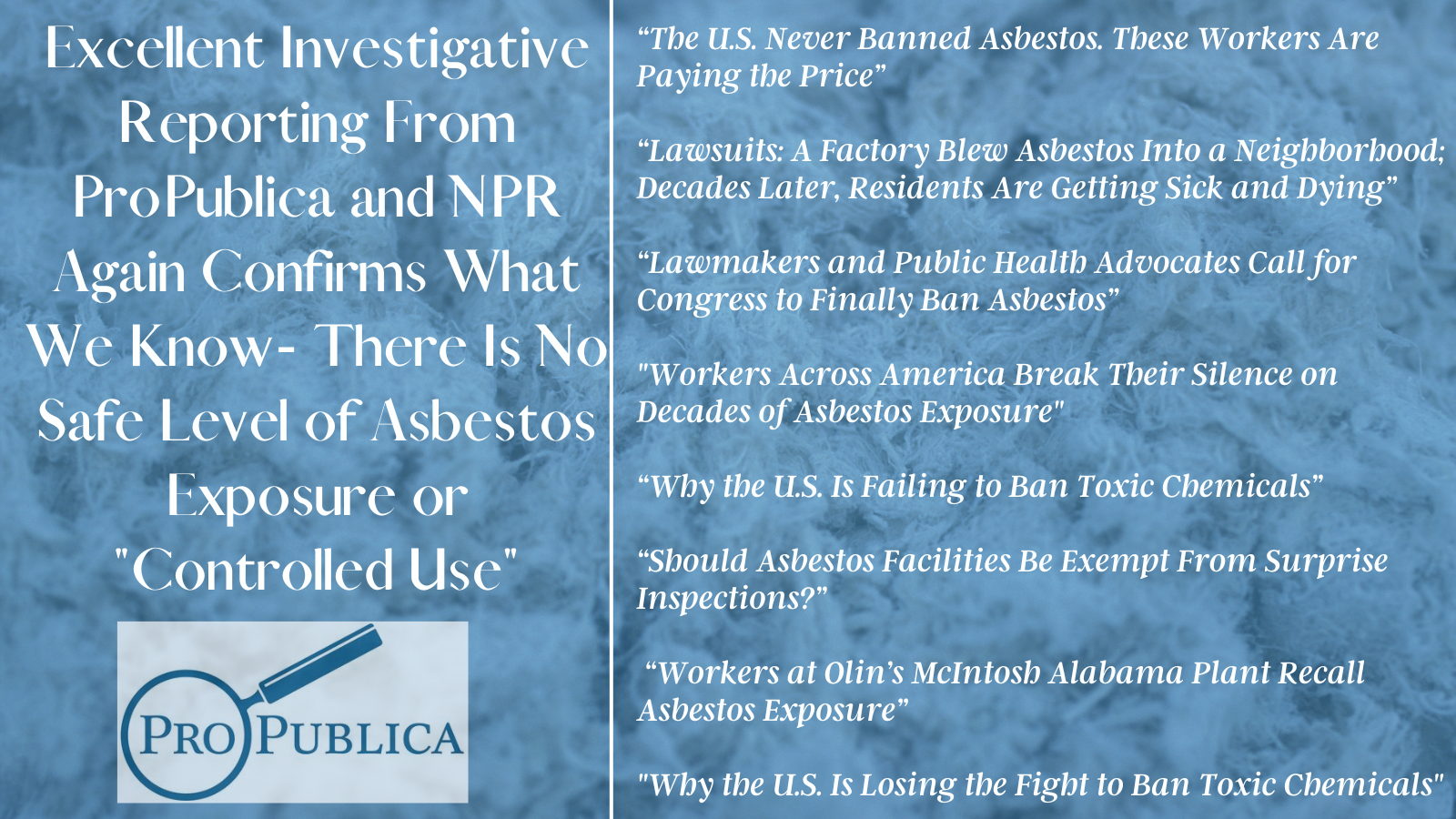Posted on December 14, 2022
ProPublica has now released several important pieces, including an in-depth investigation, that focused on the dangerous asbestos exposure from chlor-alkali plants using asbestos diaphragms. Their excellent investigations confirmed, once again, that there is no safe level of asbestos exposure and there is no such thing as “safe or controlled use.”
A December 7th, 2022 piece, “Workers Across America Break Their Silence on Decades of Asbestos Exposure,” co-published with NPR News, sheds light on Olin’s asbestos-using chlor-alkali plant located in McIntosh, Alabama. Since ProPublica’s first release, “The U.S. Never Banned Asbestos. These Workers Are Paying the Price,” which highlighted the dangerous working conditions at OxyChem’s now closed Niagara Falls Plant, workers at the McIntosh plant and others have come forward. Each report clearly contrasting what corporate giants, Olin and OxyChem, have said about worker safety at their plants. Workers, their families, and community members detail decades of dangerous asbestos exposure. ADAO also released a statement in response to ProPublica’s most recent article.
In the first piece, “The U.S. Never Banned Asbestos. These Workers Are Paying the Price,” workers explained that safety standards were routinely disregarded at the Niagara Falls plant, this sentiment was echoed by those at the McIntosh plant, a facility near Las Vegas, and another in Texas even after they raised issues to safety managers in 2018. NPR also released a 10-minute radio story about the investigation. Less than a week after the first article was released, on A second article was released by ProPublica less than a week later, “Lawsuits: A Factory Blew Asbestos Into a Neighborhood; Decades Later, Residents Are Getting Sick and Dying,” which details the lawsuits brought against OxyChem by New Yorkers who lived near the OxyChem Niagara Falls plant. The story writes that residents remember asbestos “raining from the sky. It fell on windowsills, on a Little League field and atop fresh snow.”
Workers at the plant told ProPublica that asbestos “would splatter on the ceilings and walls, roll across the floor like tumbleweeds and stick to workers’ clothes. Windows and doors were left open, allowing asbestos dust to escape. The company’s own industrial hygiene monitoring showed their workers were repeatedly exposed to unsafe levels. Federal workplace regulators had also stopped conducting regular unannounced inspections at the plant; the Occupational Safety and Health Administration included the Niagara Falls site and others like it in a special program for ‘exemplary’ workplaces.”
Building on their reporting, momentum for the Alan Reinstein Ban Asbestos Now (ARBAN) Act, the most comprehensive ban asbestos bill put before congress in over 30 years, increased as reported in the third article, “Lawmakers and Public Health Advocates Call for Congress to Finally Ban Asbestos,”. In fact, ADAO sent a letter to House and Senate Committee leadership urging Congress to make (ARBAN) a priority during lame duck session. The letter was also mentioned in the ProPublica series.
ARBAN would ban all six fibers of asbestos imports and use and provide educational materials to help people understand and adhere to the new laws. ProPublica’s article, “Why the U.S. Is Failing to Ban Toxic Chemicals,” highlights oppositional challenges from industry and the urgency for Congress to ban asbestos now. ARBAN has long held bipartisan support, and was re-introduced by Senator Jeff Merkley (D-OR) and Representative Suzanne Bonamici (D-OR) in the summer of 2022. In fact, Brazil being one of the top exporters of asbestos gained a win when Brazil’s Superior Court of Justice has ordered the immediate closure of asbestos mining, processing and export of asbestos. Additionally, many public health experts and trade unions who have witnessed the fatal impacts of asbestos exposure first-hand and have studied the lethal properties of asbestos for decades, have come forward with comments since the publishing of ProPublica’s investigations. You can read their responses down below.
Meanwhile, more media continues to surface as the ban-asbestos movement rolls forward. The Intercept released a story detailing how incarcerated individuals were forced to do a variety of harmful, high-risk jobs like asbestos abatement during the height of the covid-19 pandemic. This truly horrific practice is yet another reason why asbestos needs to be banned, so that all individuals can have their health and safety protected.
ProPublica and NPR’s excellent reporting has undoubtedly shined light on the chlor-alkali industry, the sole asbestos importer and user, who put workers, families, and communities at risk of deadly asbestos-caused diseases. An asbestos ban is long overdue. We urge Congress to make ARBAN a priority and ban this killer once and for all.
Linda Reinstein
- ProPublica: “Why the U.S. Is Failing to Ban Toxic Chemicals”
- ProPublica: “Should Asbestos Facilities Be Exempt From Surprise Inspections?” — ProPublica https://bit.ly/3FC5lIR
- ProPublica “Workers at Olin’s McIntosh Alabama Plant Recall Asbestos Exposure”
- ProPublica “The U.S. Never Banned Asbestos. These Workers Are Paying the Price”
- ProPublica“Lawsuits: A Factory Blew Asbestos Into a Neighborhood; Decades Later, Residents Are Getting Sick and Dying”
- ProPublica “Lawmakers and Public Health Advocates Call for Congress to Finally Ban Asbestos”
- NPR They inhaled asbestos for decades on the job. Now, workers break their silence
- NPR Factory workers across the U.S. say they were exposed to asbestos on the job
- ADAO ARBAN Letter to House E&C and Senate EPW Committee Leadership
